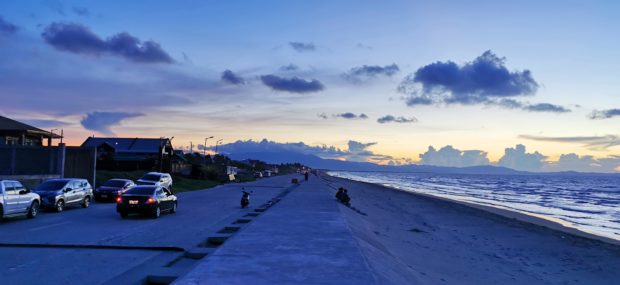Lingayen Gulf mining threat to food security, says group

ENDANGERED This beach in Binmaley town, Pangasinan province, is part of Lingayen Gulf, which will be the site of a massive magnetite (black sand) mining project that threatens to destroy the environment and local fishing industry. —WILLIE LOMIBAO
MANILA, Philippines — An advocacy group on Monday said the approval of the Department of Environment and Natural Resources (DENR) of an offshore mining project in Lingayen Gulf of Pangasinan province has the potential to destroy the marine ecosystem in the area and threaten the livelihood of fishing communities there.
Tugon Kabuhayan was referring to the approved financial or technical assistance agreement (FTAA) of Iron Ore, Gold and Vanadium Resources Phils. Inc. that would allow it to mine 9,252 hectares of seabed spanning across the cities of Alaminos, Dagupan and San Fernando where magnetite is abundant—a cost-competitive material that may be used to manufacture steel.
Asis Perez, Tugon Kabuhayan convenor and former director of the Bureau of Fisheries and Aquatic Resources (BFAR), said the project was situated between two protected areas—Alaminos Hundred Islands National Park and Agoo-Damortis Protective Landscape and Seascape—and would affect the fishing operations of Sual, considered as the country’s top milkfish producer.
He added this could be grounds for filing a petition for a writ of kalikasan, a legal remedy to halt projects potentially damaging for the environment.
“If it’s true that [the DENR has issued] an FTAA without proper process then this is possible [ground] for writ of kalikasan,” Perez said. “But cases can only be filed if there are clients so let’s see what is going to be the decision of the communities in the area.”
Article continues after this advertisementAccording to Perez, the BFAR was not informed of the offshore project even when as much as 250,000 metric tons of production volume is coming from Pangasinan.
Article continues after this advertisementChanging nature
At least two provincial board members of Pangasinan and a group of local fishers have earlier protested the project, calling it disastrous to the marine environment and the fishing industry of the province that could potentially affect at least 5,000 fishers.
“We are very much concerned about the danger this project will bring in various sectors, including aquaculture. We are equally concerned about the country’s food security knowing full well that the government has allowed the importation of fish. We are asking the government to consider and study the adverse impact of this in the livelihood of fisheries,” he said.
Fernando Siringan, a known geologist from the University of the Philippines, said dredging the seafloor would immediately change the nature of the substrate and lead to the resuspension of materials.
“The immediate impact is that you change the nature of the substrate so whatever benthic organisms that are there, they will be disturbed … Wherever they suck the sediments, there will also be resuspension … Once they got the magnetic components, they will be returning waste materials, like sand particles and the water they used to wash off the mud,” he said.
“There are several protected areas and key biodiversity areas in the Lingayen Gulf where the resuspended materials may go to. I’m really wondering how [the company] is able to secure permits when it’s adjacent to a marine protected area,” he added.
Malacañang’s approval
The FTAA application of Vanadium Resources was endorsed to but not acted upon by the Office of the President during the term of the late President Benigno Aquino III.
The Duterte administration returned the application to the DENR for further evaluation. It was later endorsed to Malacañang again and was eventually approved in November last year.
In April, President Duterte issued Executive Order No. 130 lifting the nine-year ban on the issuance of new mining permits to spur more investments in the extractive industry as a means to help the country recover from the financial straits caused by the coronavirus pandemic. INQ